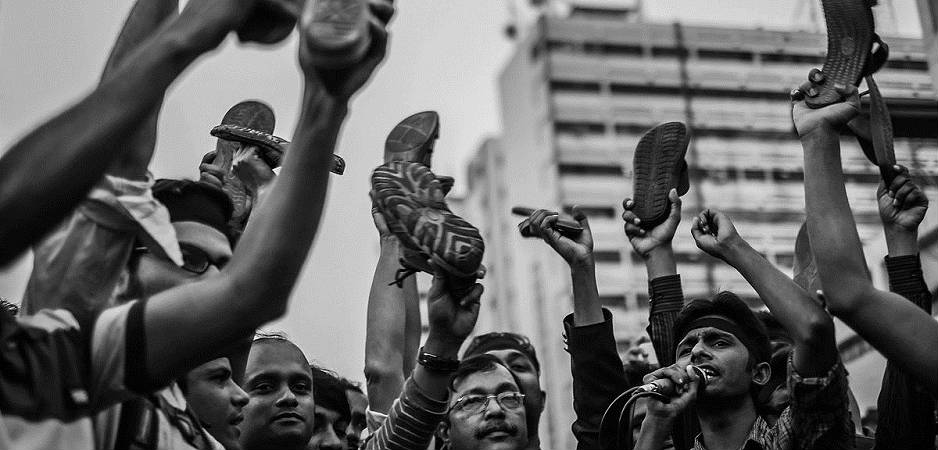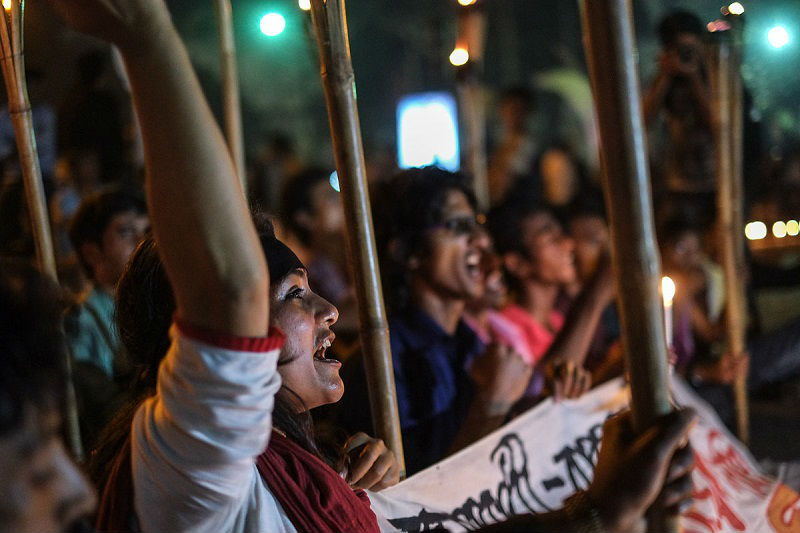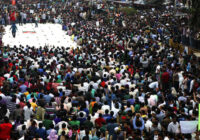Following the brutal murder of Avijit Roy, another writer has been killed in Bangladesh.
Washiqur Rahman, a Bangladeshi blogger, was hacked to death on the streets of Dhaka on March 30. Two men were taken into custody and police are still looking for a third.
Rahman, aged 27, used satire against religious fundamentalism as a member of Bangladesh’s community of progressive bloggers. His murder comes barely a month after blogger Avijit Roy was killed in an almost identical attack.
As was the case in Roy’s death, Islamist extremists were responsible. It is true that radical Islam is gaining momentum in Bangladesh. But to see this as just another act of terrorism misses the point.
In an interview with Deutsche Welle, Bangladesh expert Tazreena Sajjad said: “[I]t is important to be mindful of solely analyzing the recent events in Bangladesh in terms of ‘Muslim hatred for freedom of speech,’ which dominant narratives in the West seem to imply.”
Bangladesh has been rocked by violence, riots, political dysfunction and a bitter war crimes trial. The deaths of Rahman and Roy are emblematic of a country that is rapidly becoming lawless. The ruling Awami League has become more authoritarian and dismissive of minority parties, while the political opposition has taken to the streets in a fight over the government’s legitimacy. Over 100 people have died since January, scores have been injured and the economy has been brought to a standstill. But this is not merely the work of religious extremists. This is the legacy of Bangladesh’s 1971 Liberation War.
Bangladesh, originally East Pakistan, fought a war of liberation against Islamabad. This war of independence was led by the Awami League, but opposed by the Jamaat-e-Islami political party. Nearly 3 million people were killed and millions more became refugees. The atrocities committed by the Pakistani army were horrendous, and the violence that accompanied Bangladesh’s birth as a nation followed it through the years in the form of coups, counter-coups, political assassinations and general violence.
It was only in 2008 that the Awami League managed to gain enough seats in parliament to create a war crimes tribunal. The trials have bitterly divided Bangladesh ever since. This has only contributed to the political impasse between the Awami League, led by Prime Minister Sheikh Hasina, and the Bangladesh National Party (BNP), which is headed by Khaleda Zia.
Since January 5, the BNP and its allies have called for strikes to demand the resignation of the ruling party. The tribunals have been strongly criticized, and there seems to be no end in sight to the turmoil gripping the country.
Heart of Bangladesh
Avijit Roy was known in Western media as a blogger. In Bangladesh, he was an institution. His blog, Mukto-Mona (now a pitch black screen with the words, “We are united in our grief and remain undefeated”) runs content that is critical of all forms of dogma.
Educated as an engineer, Roy translated many scientific books into Bengali, helping to make such subjects accessible to many Bangladeshis. He was known as a patient, soft-spoken man who was happy to help mentor fellow writers and thinkers. His advocacy of freedom of expression was relentless, as he helped organize worldwide protests against censorship and oppression of free-thought. Mukto-Mona’s co-editor, Farid Ahmed, described him as “the pioneer [of online writing]” in Bangladesh.
Extremists had harassed bloggers like Rahman and Roy for some time, but the controversial decisions of the war crimes tribunal likely made the two men more vulnerable targets.
The Shahbag protests took place in 2013, in response to the tribunal’s controversial decision to seek life imprisonment for Abdul Quader Mollah, a key Jamaat-e-Islami figure in the 1971 conflict. Protesters demanded he be put to death, and they also called for a ban on the Islamist party. Tens of thousands participated. Anti-fundamentalists like Rahman and Roy found common cause with this movement. Jamaat-e-Islami, feeling threatened, encouraged Islamists to take to the streets in counter-protest.
Violent fundamentalists egged on by ambitious politicians and a generally anarchic environment set the stage for the tragic losses of brilliant minds like Washiqur Rahman, Avijit Roy and others. Rahman is the third writer to be killed in Bangladesh in the last 12 months. Sadly, he will probably not be the last.
But why is it that such crimes have received far less attention in Western media than the Charlie Hebdo attacks in January? One could say that those who struck at Charlie Hebdo struck at the heart of the idea of France, a secular and open-minded society.
This is a mistake. The attacks on Rahman, Roy and others also strike at the heart of Bangladesh, a country founded on secularism and democratic principles. Although the South Asian country has the fourth largest Muslim population in the world, it is also very diverse. The issue of language was a main bone of contention between Urdu-speaking Pakistan and its breakaway eastern province. The requirement to work — if not embrace — diversity makes Bangladesh in some respects more similar to India than Pakistan.
But there is a larger point. The West, especially after 9/11, has defined itself as a lone outpost of freedom in a world that is hostile to human rights. It is this mistaken belief that has hampered a deeper understanding of terrorism, religion and political violence in countries like Bangladesh, and also undermined attempts to shore up democratic values in non-Western countries.
This error has not only harmed the world’s ability to protect writers like Rahman and Roy. It has also created an environment where, when it comes to countries like Bangladesh, the worst is expected, action is not taken and the consequences are reaped.
The views expressed in this article are the author’s own and do not necessarily reflect Fair Observer’s editorial policy.
Photo Credit: Mehdi Hasan Khan / Wiki Commons
 We bring you perspectives from around the world. Help us to inform and educate. Your donation is tax-deductible. Join over 400 people to become a donor or you could choose to be a sponsor.
We bring you perspectives from around the world. Help us to inform and educate. Your donation is tax-deductible. Join over 400 people to become a donor or you could choose to be a sponsor.
Support Fair Observer
We rely on your support for our independence, diversity and quality.
For more than 10 years, Fair Observer has been free, fair and independent. No billionaire owns us, no advertisers control us. We are a reader-supported nonprofit. Unlike many other publications, we keep our content free for readers regardless of where they live or whether they can afford to pay. We have no paywalls and no ads.
In the post-truth era of fake news, echo chambers and filter bubbles, we publish a plurality of perspectives from around the world. Anyone can publish with us, but everyone goes through a rigorous editorial process. So, you get fact-checked, well-reasoned content instead of noise.
We publish 2,500+ voices from 90+ countries. We also conduct education and training programs
on subjects ranging from digital media and journalism to writing and critical thinking. This
doesn’t come cheap. Servers, editors, trainers and web developers cost
money.
Please consider supporting us on a regular basis as a recurring donor or a
sustaining member.
Will you support FO’s journalism?
We rely on your support for our independence, diversity and quality.







Comment